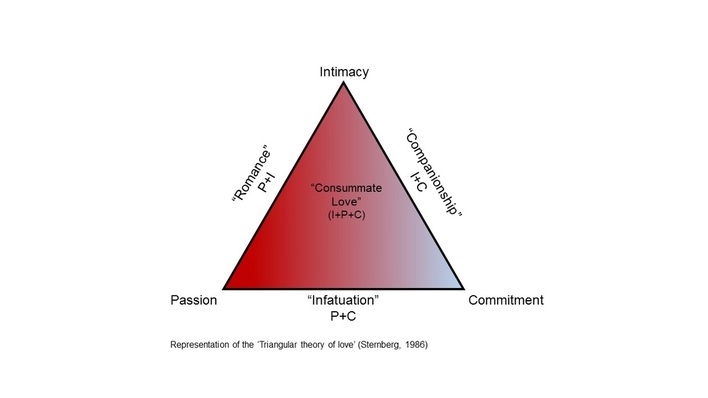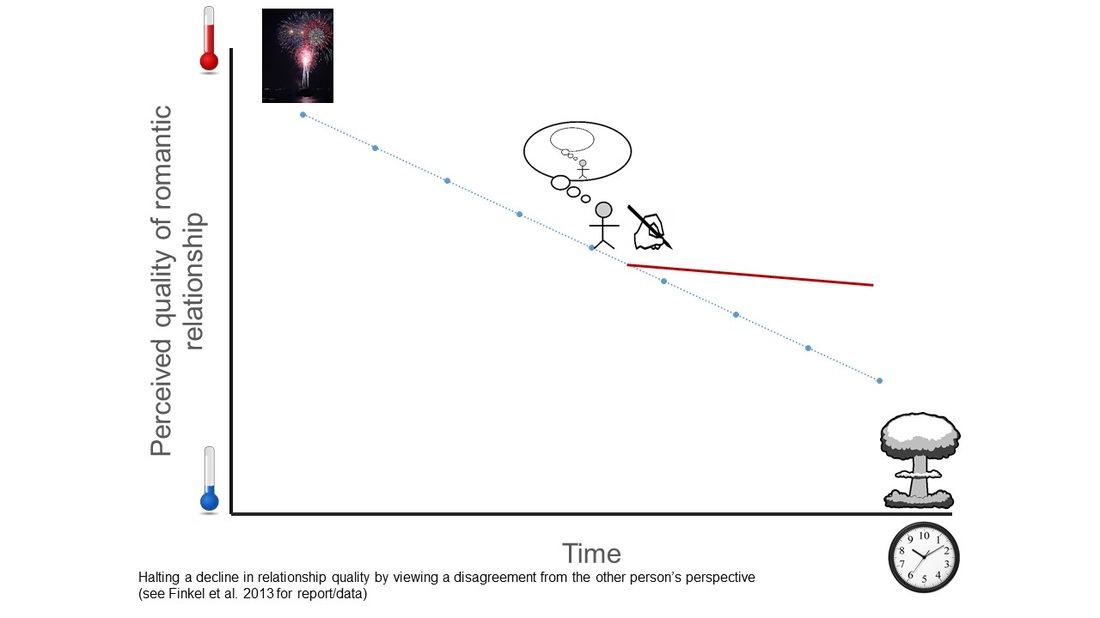
Dr Christopher Watkins
“You’ve lost that lovin’ feelin’ – whoa, that lovin’ feelin’ – You’ve lost that lovin’ feelin’, now it’s gone... gone... gone…” – The Righteous Brothers
Many of us at some point in our lives crave love or a bit of romance or passion – and, ideally, for that feeling to last! Many shops hold excess ‘self-help’ books on the subject, and television experts give advice about how to find love and keep it. Are they helpful or do they sometimes confuse the issue, particularly when they discuss the reasons why love may or may not sustain the test of time?
Classically in psychology, there are thought to be three components to love – intimacy, passion and commitment – when all three are combined together into the ideal recipe, the love is said to be ‘consummate’. Feeling close to your partner, longing for him or her on a physical level, and having made the plans to stick with them and achieve goals together (lucky you, right?).
In general, positive romantic relationship quality is related to various measures of wellbeing – those who describe themselves as ‘very happy’ in their relationship also describe themselves as very happy in general. How and why might this feeling last, if this is what we desire?
Perhaps discouragingly, research suggests that perceived relationship quality declines over time, compared to the ‘fiery passion’ that may be associated with the adventure of a brand new relationship – but does this tell us all of the story?
In short, no. First of all, relationships, on average, decline in quality over time. This is an important point (in statistical terms) if reading about such research influences how individual couples look into a crystal ball at the future of their relationship after such heady and wild beginnings (i.e., all else equal, a typical couple, but not all couples will report relatively lower quality in their relationship compared to when it first kicks off and love feels like a drug).
But the brain can adapt to addictive substances which means, by definition, it may no longer ‘feel’ like a high.
Relatively lower relationship quality over time might simply reflect the trials and tribulations that would test any partnership over time – something that dating sites do not currently account for when attempting to match two people via their supposedly-successful algorithms (yet to be put to the test of science…).
But it might also reflect the many factors of relationship quality that move up or down the priority list over time. Researchers identify four dimensions – intimacy, agreement (going in the same direction), independence (a degree of ‘space’) and sexuality. Although all facets may play their role at various times, men and women overall rank intimacy highest and sexuality last on the list – both sexes value the experience of being understood and cared for, and being in a relationship where each takes some time to listen-to, talk-to, empathise-with or take interest in the other. Indeed, romantic love can last over time – psychologically, romantic love appears to be completely separate from ‘obsessional’ love that might be typical of the early-stages of a relationship. While feeling an intense connection with your partner is related to self-esteem and wellbeing, by contrast, there is a slight benefit to obsessional love in the early stages of a relationship, but a slight detrimental effect of obsession on relationship quality in the longer-term – for example, not being able to control your thoughts – because your brain is firmly fixated on him/her!
Romantic commitment may have been crucial for the human species – particularly a species such as ours, with ‘big brains’ and longer periods of investment in offspring to a point at which they reach ‘independence’. It seems, in turn, that we have developed many unique displays or ‘signals’ of love, to inform our partner that the feeling of commitment is there to stay. Recent work, for example, suggests that both ‘good’ and frequent kissing is related to relationship quality – sexual satisfaction is related to relationship quality (but is about half as important, in statistical terms, compared to having a partner who you think is a ‘good kisser’), but actual frequency of sex with partner has no bearing at all on relationship quality. Interestingly (and not following on from the previous sentence), even short-lived experiences of love might assist us in both good and bad times....
When couples are asked to talk about a positive recent event to their partner (not disclosed previously), simply sharing this story boosts self-reported feelings of love and not just their general mood. These brief experiences generate 'approach responses' toward partners, such as your desire for them, and nonverbal displays of love such as approving nods of head, leaning in, making gestures and producing genuine smiles. Crucially, those who report more love and show more love in the laboratory, also report sharing more activities together and are more involved in one another’s life goals. Such displays of love (even in a psychology lab) predict later success at working-out conflicts together, feelings of mutual trust and teasing one another in a loving (rather than hostile) way.
When dealing with challenges to relationship quality over time, the solution might not be that time-consuming or costly. Over time, a mental account of past disagreements or conflicts with your partner might build up ill-feeling or ‘debt’ in your account of a relationship over time – which could have a self-fulfilling effect on how arguments flourish from nowhere! But a simple 7 minutes’ worth of reflection (over several stages) on prior conflict from the perspective of a neutral third party directly-reduces distress – boosting empathy for your partner and how good you judge your relationship to be in general.
So while relationships may slope downward over time (on average), the decline is far from inevitable for individuals. Sharing time even in brief encounters boosts feelings of love and how couples talk through prior conflicts. Empathising with different points of view might also have powerful implications for how we re-evaluate past conflicts and then move forward constructively.
It’s important to think about the multi-faceted nature of relationship quality – thinking about only one piece of the puzzle might promote defeatist or cynical attitudes about long-term relationships – completely unnecessarily! This may be especially relevant for those who believe in ‘true love’ and are overly-sensitive to changes to their relationship such as losing the ‘magic’ – when all that might be happening is that their relationship is flowering into a slightly different form. Just because someone might think they have lost that ‘lovin’ feelin’’ – it doesn’t mean to say it has gone, gone, gone…
Suggested further reading
Haidt, J. (2007). The Happiness Hypothesis: Putting Ancient Wisdom to the Test of Modern Science. Arrow.
Finkel, E.J., Slotter, E.B., Luchies, L.B., Walton, G.M. & Gross, J.J. (2013) A brief intervention to promote conflict reappraisal preserves marital quality over time. Psychological Science, 24, 1595-1601.
“You’ve lost that lovin’ feelin’ – whoa, that lovin’ feelin’ – You’ve lost that lovin’ feelin’, now it’s gone... gone... gone…” – The Righteous Brothers
Many of us at some point in our lives crave love or a bit of romance or passion – and, ideally, for that feeling to last! Many shops hold excess ‘self-help’ books on the subject, and television experts give advice about how to find love and keep it. Are they helpful or do they sometimes confuse the issue, particularly when they discuss the reasons why love may or may not sustain the test of time?
Classically in psychology, there are thought to be three components to love – intimacy, passion and commitment – when all three are combined together into the ideal recipe, the love is said to be ‘consummate’. Feeling close to your partner, longing for him or her on a physical level, and having made the plans to stick with them and achieve goals together (lucky you, right?).
In general, positive romantic relationship quality is related to various measures of wellbeing – those who describe themselves as ‘very happy’ in their relationship also describe themselves as very happy in general. How and why might this feeling last, if this is what we desire?
Perhaps discouragingly, research suggests that perceived relationship quality declines over time, compared to the ‘fiery passion’ that may be associated with the adventure of a brand new relationship – but does this tell us all of the story?
In short, no. First of all, relationships, on average, decline in quality over time. This is an important point (in statistical terms) if reading about such research influences how individual couples look into a crystal ball at the future of their relationship after such heady and wild beginnings (i.e., all else equal, a typical couple, but not all couples will report relatively lower quality in their relationship compared to when it first kicks off and love feels like a drug).
But the brain can adapt to addictive substances which means, by definition, it may no longer ‘feel’ like a high.
Relatively lower relationship quality over time might simply reflect the trials and tribulations that would test any partnership over time – something that dating sites do not currently account for when attempting to match two people via their supposedly-successful algorithms (yet to be put to the test of science…).
But it might also reflect the many factors of relationship quality that move up or down the priority list over time. Researchers identify four dimensions – intimacy, agreement (going in the same direction), independence (a degree of ‘space’) and sexuality. Although all facets may play their role at various times, men and women overall rank intimacy highest and sexuality last on the list – both sexes value the experience of being understood and cared for, and being in a relationship where each takes some time to listen-to, talk-to, empathise-with or take interest in the other. Indeed, romantic love can last over time – psychologically, romantic love appears to be completely separate from ‘obsessional’ love that might be typical of the early-stages of a relationship. While feeling an intense connection with your partner is related to self-esteem and wellbeing, by contrast, there is a slight benefit to obsessional love in the early stages of a relationship, but a slight detrimental effect of obsession on relationship quality in the longer-term – for example, not being able to control your thoughts – because your brain is firmly fixated on him/her!
Romantic commitment may have been crucial for the human species – particularly a species such as ours, with ‘big brains’ and longer periods of investment in offspring to a point at which they reach ‘independence’. It seems, in turn, that we have developed many unique displays or ‘signals’ of love, to inform our partner that the feeling of commitment is there to stay. Recent work, for example, suggests that both ‘good’ and frequent kissing is related to relationship quality – sexual satisfaction is related to relationship quality (but is about half as important, in statistical terms, compared to having a partner who you think is a ‘good kisser’), but actual frequency of sex with partner has no bearing at all on relationship quality. Interestingly (and not following on from the previous sentence), even short-lived experiences of love might assist us in both good and bad times....
When couples are asked to talk about a positive recent event to their partner (not disclosed previously), simply sharing this story boosts self-reported feelings of love and not just their general mood. These brief experiences generate 'approach responses' toward partners, such as your desire for them, and nonverbal displays of love such as approving nods of head, leaning in, making gestures and producing genuine smiles. Crucially, those who report more love and show more love in the laboratory, also report sharing more activities together and are more involved in one another’s life goals. Such displays of love (even in a psychology lab) predict later success at working-out conflicts together, feelings of mutual trust and teasing one another in a loving (rather than hostile) way.
When dealing with challenges to relationship quality over time, the solution might not be that time-consuming or costly. Over time, a mental account of past disagreements or conflicts with your partner might build up ill-feeling or ‘debt’ in your account of a relationship over time – which could have a self-fulfilling effect on how arguments flourish from nowhere! But a simple 7 minutes’ worth of reflection (over several stages) on prior conflict from the perspective of a neutral third party directly-reduces distress – boosting empathy for your partner and how good you judge your relationship to be in general.
So while relationships may slope downward over time (on average), the decline is far from inevitable for individuals. Sharing time even in brief encounters boosts feelings of love and how couples talk through prior conflicts. Empathising with different points of view might also have powerful implications for how we re-evaluate past conflicts and then move forward constructively.
It’s important to think about the multi-faceted nature of relationship quality – thinking about only one piece of the puzzle might promote defeatist or cynical attitudes about long-term relationships – completely unnecessarily! This may be especially relevant for those who believe in ‘true love’ and are overly-sensitive to changes to their relationship such as losing the ‘magic’ – when all that might be happening is that their relationship is flowering into a slightly different form. Just because someone might think they have lost that ‘lovin’ feelin’’ – it doesn’t mean to say it has gone, gone, gone…
Suggested further reading
Haidt, J. (2007). The Happiness Hypothesis: Putting Ancient Wisdom to the Test of Modern Science. Arrow.
Finkel, E.J., Slotter, E.B., Luchies, L.B., Walton, G.M. & Gross, J.J. (2013) A brief intervention to promote conflict reappraisal preserves marital quality over time. Psychological Science, 24, 1595-1601.


 RSS Feed
RSS Feed